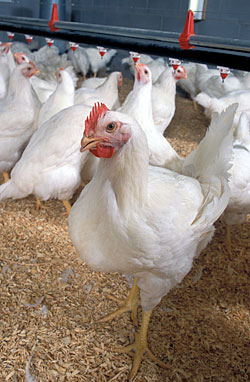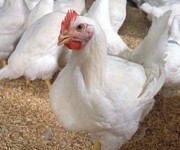In June, the USDA released an update to the rules that govern how poultry are sold. It’s complicated stuff, but the goal is to eliminate monopolistic practices among large processors and producers.
 (USDA photo)As USDA Chief Tom Vlisack commented at the time, the new rules are designed to create “a fair and more transparent relationship between the folks on the farm and the businesses that are packing and processing what’s raised on the farm.” An analysis [PDF] by the Organization for Competitive Markets, a group dedicated to reducing monopolistic practices in agriculture, claimed that the new rules were relatively simple, and at four pages blissfully short (at least by bureaucratic standards). They mostly consist of requirements to use standard definitions in contracts. The updated rules would also allow growers to sue processors over unfair practices, without having to prove that the processors are stifling competition generally.
(USDA photo)As USDA Chief Tom Vlisack commented at the time, the new rules are designed to create “a fair and more transparent relationship between the folks on the farm and the businesses that are packing and processing what’s raised on the farm.” An analysis [PDF] by the Organization for Competitive Markets, a group dedicated to reducing monopolistic practices in agriculture, claimed that the new rules were relatively simple, and at four pages blissfully short (at least by bureaucratic standards). They mostly consist of requirements to use standard definitions in contracts. The updated rules would also allow growers to sue processors over unfair practices, without having to prove that the processors are stifling competition generally.
Naturally, industry groups have gone bananas at the idea that the playing field might be leveled for small producers. There has been a whirlwind of lobbying activity against the rules, which according to a Capitol Hill source, has simply not been matched by supporters of the new rules. The agribusiness outrage culminated in a bizarre scene at a House Agriculture Subcommittee hearing yesterday, during which virtually every member — Democrat and Republican — eviscerated USDA Undersecretary Edward Avalos over the proposed rules. The Progressive Farmer Ag Policy editor Chris Clayton offered a taste (free sub req’d) of what he referred to as the “can of Whoop *&%” that was emptied on the head of poor Avalos, in particular by Livestock, Dairy, and Poulty Subcommittee Chair Democrat David Scott of Georgia:
Scott said USDA officials had “very, very seriously overstepped their boundaries … ” [and included] provisions … that “were soundly rejected” by the House Agriculture Committee, the House, the Senate, and conference committee during the 2008 farm bill debate.
“And for you and the department to arbitrarily go against the wishes and the intent of Congress is a serious — It is what Shakespeare said when he referred to, ‘And to Brutus, yours was the meanest cut of all’ — that’s what this has done. That’s why you have heard the passion, the disappointment that was registered by both sides of the aisle against this proposed rule.”
Scott said the least USDA could do is extend the comment period for the proposed rule another 60 days to 120 days “so we that know there is some discussion within the industry.”
He wasn’t alone. Rep. Jim Costa (D-Calif.) suggested that the new rule is “a lawyer’s field day to sue.” Rep. Jim Minnick (D-Idaho) simply called the proposed rule “silly.”
For the record, the talk of extending the comment period on the rule has nothing to do with improving the rule and everything to do with giving industry more time to water down if not kill it. Ah, the House Ag Committee. Where reform goes to die.
Was there anyone who spoke out in favor of added protections for small farmers? Sort of. Rep. Leonard Boswell (D-Iowa) meekly observed that he thought the USDA did at least have the authority to make a rule if it wanted to. Not exactly full-throated support for the little guy. Even pros like Clayton and the Des Moines Register‘s Phil Brasher, no strangers to the ways of Congress, expressed surprise via Twitter at the tone of the hearing.
If there’s any good news in this embarrassing display of fealty to industrial agriculture by members of Congress, it’s the indication that these reforms, simple as they in fact are, would be effective. It’s also true that the Senate has expressed greater support for the new rules. And while Senate Ag Committee Chair Blanche Lincoln, a grateful recipient of the largesse of the poultry giant Tyson Foods (which would be particularly affected by the new rules), is no fan, she is also over 20 points down in the polls. Assuming the Democrats retain the Senate, the far more progressive Debbie Stabenow of Michigan will take over the committee and perhaps will prove a better ally to reformers.
On the one hand, reformers do appear to be outgunned and outmatched on this issue as they are on so many. On the other, it appears we may be approaching an inflection point in food policy, where proposed reforms are starting to bite. Should Big Meat prevail and preserve the staus quo, it may be a long time before any administration attempts this sort of change again.




